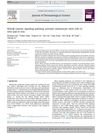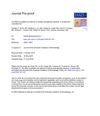 96 citations,
July 2014 in “Cold Spring Harbor Perspectives in Medicine”
96 citations,
July 2014 in “Cold Spring Harbor Perspectives in Medicine” The document concludes that adult mammalian skin contains multiple stem cell populations with specific markers, important for understanding skin regeneration and related conditions.
 82 citations,
June 2020 in “Inflammation Research”
82 citations,
June 2020 in “Inflammation Research” Skin problems in COVID-19 patients are rare and may be due to the body's complex immune response or blood clotting issues.
 77 citations,
March 2014 in “Cold Spring Harbor Perspectives in Medicine”
77 citations,
March 2014 in “Cold Spring Harbor Perspectives in Medicine” Fat cells are important for healthy skin, hair growth, and healing, and changes in these cells can affect skin conditions and aging.
 67 citations,
January 2013 in “Indian Journal of Dermatology, Venereology and Leprology”
67 citations,
January 2013 in “Indian Journal of Dermatology, Venereology and Leprology” The document concludes that alopecia areata is an autoimmune disease without a definitive cure, but treatments like corticosteroids are commonly used.
 63 citations,
May 2017 in “American Journal of Clinical Dermatology”
63 citations,
May 2017 in “American Journal of Clinical Dermatology” People with alopecia areata often have lower levels of vitamin D, zinc, and folate, but more research is needed to understand if supplements can help treat it.
 51 citations,
March 2014 in “Nature Communications”
51 citations,
March 2014 in “Nature Communications” Skin tumor regression is helped by retinoic acid signaling blocking Wnt signaling.
 50 citations,
May 2019 in “Drugs”
50 citations,
May 2019 in “Drugs” Cannabinoids may help treat chronic and chemotherapy-induced neuropathic pain, but more research is needed to confirm their effectiveness and safety.
 45 citations,
April 2016 in “Journal of Dermatological Science”
45 citations,
April 2016 in “Journal of Dermatological Science” The Wnt/β-catenin pathway can activate melanocyte stem cells and may help regenerate hair follicles.
 36 citations,
November 2018 in “American Journal of Clinical Dermatology”
36 citations,
November 2018 in “American Journal of Clinical Dermatology” Alopecia is linked to various health and mental conditions, impacts life quality, and needs medical attention beyond its cosmetic effects.
 33 citations,
July 2020 in “Journal of The American Academy of Dermatology”
33 citations,
July 2020 in “Journal of The American Academy of Dermatology” PRP treatment improves hair density and thickness for alopecia, but needs more research.
 23 citations,
July 2008 in “British journal of dermatology/British journal of dermatology, Supplement”
23 citations,
July 2008 in “British journal of dermatology/British journal of dermatology, Supplement” Topical contact sensitizers can treat certain skin conditions but are rarely used in the U.K.
 21 citations,
November 2017 in “Scientific Reports”
21 citations,
November 2017 in “Scientific Reports” Different human hair follicle stem cells grow at different rates and respond differently to a baldness-related compound.
 20 citations,
June 2010 in “Genes and Immunity”
20 citations,
June 2010 in “Genes and Immunity” Blood tests can help understand the genetic differences in people with alopecia areata, including how severe it is and if it's inherited.
 18 citations,
July 2020 in “Journal of The American Academy of Dermatology”
18 citations,
July 2020 in “Journal of The American Academy of Dermatology” PRP injections improve hair density and thickness in women with hair loss.
 18 citations,
January 2017 in “Postępy Dermatologii i Alergologii”
18 citations,
January 2017 in “Postępy Dermatologii i Alergologii” EGFR inhibitors can cause various skin issues during cancer treatment, and managing these is important for patient care.
 17 citations,
December 2015 in “International Journal of Cosmetic Science”
17 citations,
December 2015 in “International Journal of Cosmetic Science” Visible light can improve skin disorders and hair loss, but more research is needed to understand long-term effects.
 13 citations,
January 2022 in “Stem cell reviews and reports”
13 citations,
January 2022 in “Stem cell reviews and reports” Mouse stem cells from hair follicles can improve wound healing and reduce scarring.
 12 citations,
November 2017 in “Archives of Dermatological Research”
12 citations,
November 2017 in “Archives of Dermatological Research” Mediterranean diet with fresh herbs and vegetables lowers male hair loss risk.
 12 citations,
April 2014 in “Molecular Medicine Reports”
12 citations,
April 2014 in “Molecular Medicine Reports” Targeting specific miRNAs may help treat hair follicle issues caused by hydrogen peroxide.
 12 citations,
June 2003 in “Journal of the European Academy of Dermatology and Venereology”
12 citations,
June 2003 in “Journal of the European Academy of Dermatology and Venereology” Some psychoactive drugs can cause skin reactions, with carbamazepine having a higher risk, and stopping the drug and seeing a dermatologist is important.
 11 citations,
June 2022 in “Frontiers in immunology”
11 citations,
June 2022 in “Frontiers in immunology” New protein changes may be involved in the immune attack on hair follicles in alopecia areata.
 11 citations,
March 2018 in “Anais Brasileiros de Dermatologia”
11 citations,
March 2018 in “Anais Brasileiros de Dermatologia” Betamethasone can effectively treat alopecia areata.
 9 citations,
October 2020 in “Journal of The American Academy of Dermatology”
9 citations,
October 2020 in “Journal of The American Academy of Dermatology” Low-dose oral minoxidil is an effective and well-tolerated treatment for hair growth in alopecia patients.
 9 citations,
January 2005 in “Experimental dermatology”
9 citations,
January 2005 in “Experimental dermatology” Melatonin receptors in hair follicles help regulate hair growth and could treat hair loss.
 8 citations,
December 2021 in “International Journal of Family Studies, Food Science and Nutrition Health”
8 citations,
December 2021 in “International Journal of Family Studies, Food Science and Nutrition Health” Extra virgin olive oil may boost the immune system and help fight infections like COVID-19.
8 citations,
January 2015 in “Genetics and Molecular Research” Certain gene variations increase the risk of alopecia areata in Koreans.
 7 citations,
November 2020 in “Journal of The American Academy of Dermatology”
7 citations,
November 2020 in “Journal of The American Academy of Dermatology” Low-dose oral minoxidil may cause side effects like hypertrichosis and is not suitable for everyone.
 7 citations,
June 2019 in “Australasian Journal of Dermatology”
7 citations,
June 2019 in “Australasian Journal of Dermatology” Elderly men with a scalp condition healed in about 26 days using specific creams and dressings, with no return of the condition in 6 months.
 7 citations,
May 2012 in “British Journal of Dermatology”
7 citations,
May 2012 in “British Journal of Dermatology” Chemical exposure may contribute to the rise in atopic diseases and needs more research.
 7 citations,
April 1994 in “Archives of Otolaryngology-head & Neck Surgery”
7 citations,
April 1994 in “Archives of Otolaryngology-head & Neck Surgery” Scalp expansion is an effective way to reconstruct the scalp with good cosmetic outcomes.




























